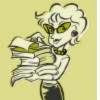 Johnson, Angela. 1993. TONING THE SWEEP. New York, NY: Orchard Books. ISBN 978-0-531-086261
Johnson, Angela. 1993. TONING THE SWEEP. New York, NY: Orchard Books. ISBN 978-0-531-086261PLOT SUMMARY
Emmie and her mother are going to the desert to collect Ola, Emmie’s grandmother. Unlike her annual summer visits to Ola’s house, this time Emmie is helping her move to Cleveland to live with them. Before they leave, Emmie sets out to gather memories for Ola by videotaping her friends and neighbors. Not only does she learn how much her grandmother is loved, but also why her own mother is sometimes so sad and angry. In this slow-moving novel, a young girl helps her mother and grandmother through a process of healing and closure. Author Angela Johnson attempts to reveal how emotional hurt runs as deeply as that of physical ailments in TONING THE SWEEP.
CRITICAL ANALYSIS
TONING THE SWEEP is the story of a 14-year old African-American girl who travels to her grandmother’s house with her mother. The girl, Emmie, has visited Ola, her grandmother, every summer since she was two. This visit, however, is different. Through the use of language, characterization and setting, Angela Johnson writes a story which allows the reader to watch a family deal with life-threatening disease and the loss of loved ones through a uniquely African-American lens.
As the characters talk to one another, their relationships as well as their culture are exposed. “Girl, you’d better put that hat on…” (p. 8). “I hope you never get to see hate, baby” (p. 33). The characters’ concern and love for one another comes through in their dialog. Further, terms of endearment such as baby, girl, honey, and sister are terms often used in African-American culture. Other phrases which connote generational as much as ethnic culture are used throughout the novel. As Emmie practices using the video camera she admits, “guess I’ll get it when I chill a little” (p. 19).
While ethnicity is never an overt topic in TONING THE SWEEP, characterization provides hints throughout the story. The main character, Emmie, has a variety of characteristics. Her grandmother affirms she is a “smart ass”—a typical teenage trait. However, Emmie admits to not having a clue about how to be cool. She thinks to herself that most of her friends wouldn’t admit to liking their grandmothers as she does. Ola is an irreverent and bold character. At one point in the story she tells Emmie, “Hair should be kept at home—not loaned out to people who want to put strange objects and creams in it…when you know your pets will be scared of you when you get back to the house” (p. 44). This statement can be attributed to Ola’s lack of vanity. However, it may also be a rejection of the phenomenon of Black people buying into the White definition of beauty. Ola surrounds herself with good friends such as the aunts. The aunts are described in the story as wild and free. They tell stories, braid hair, and roll on the floor laughing. With Johnson’s description, it is easy to draw a mental picture of these senior African-American sisters.
The dry, seemingly infertile setting of the desert is juxtaposed with the thriving, fertile personalities which inhabit it. While Ola initially wonders what she will be able to grow in “the dry,” it is clear she has nurtured many lush relationships. These relationships helped her to survive losing her husband and growing apart from her daughter. Despite her loses, Ola’s warm and easy relationship with her granddaughter flourishes like kudzu vine in this barren setting.
The language, characterization and setting in TONING THE SWEEP contribute to the plot and cultural relevance of the story. As the characters interact with the setting and one another, the reader senses the familial bonds and culture which Johnson has set forth.
REVIEW EXCERPTS
“Johnson's spare, beautifully written first novel—a thematic extension of Tell Me a Story, Mama (1989)—portrays a crucial turning point for African-American women from three generations.” (Kirkus Reviews)
“PW, in a starred review, praised this “thoughtfully nuanced and penetrating” novel about three generations of women from an African American family who must cope with a beloved grandmother's illness.” (Publisher’s Weekly)
Coretta Scott King Award, 1994
Reviews obtained from Follett Library Resources and accessed at:
http://www.flr.follett.com/main?SID=b8eed00e8fcf7b8bd35cecbbffabda05
CONNECTIONS
Other books by Angela Johnson:
Bird, ISBN 978-0-14-240544-4
The Other Side: Shorter poems, ISBN 978-0-531-07167-0
The First Part Last, ISBN 978-0-689-84923-7
Heaven, ISBN 978-0-689-82229-2
Books by Jacqueline Woodson:
Behind You, ISBN 978-0-14-240390-7
Between Madison and Palmetto, ISBN 978-0-399-23757-7
Locomotion, ISBN 978-0-14-240149-1

No comments:
Post a Comment